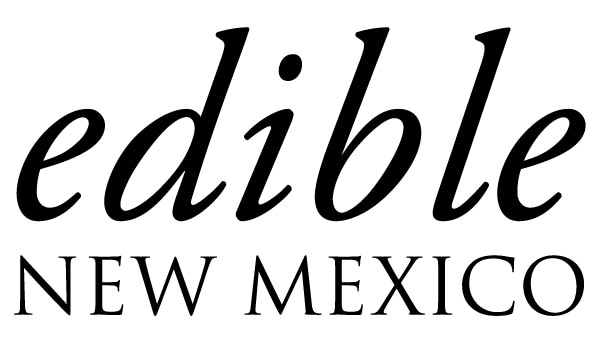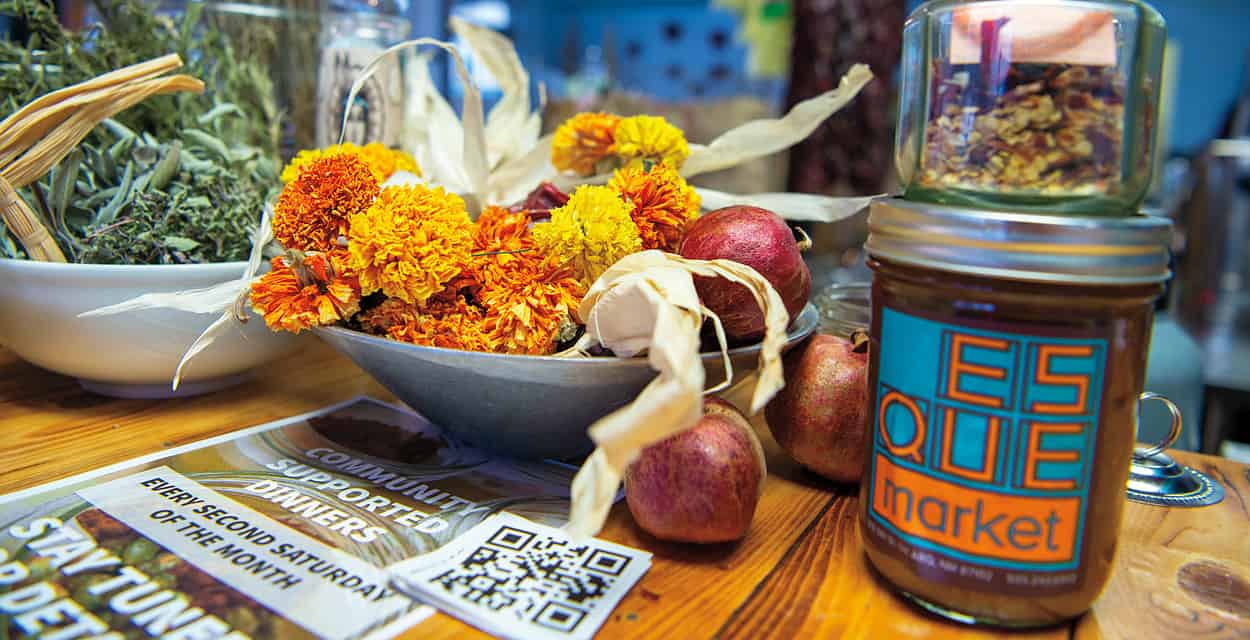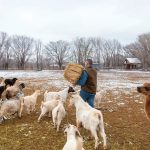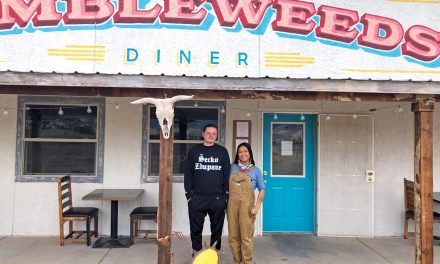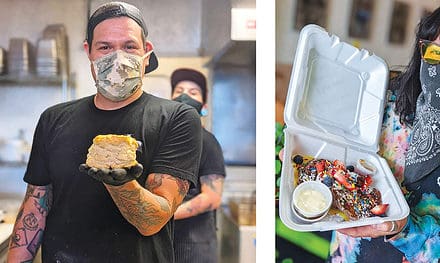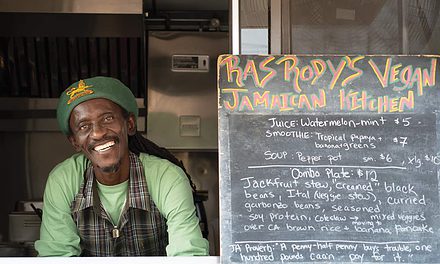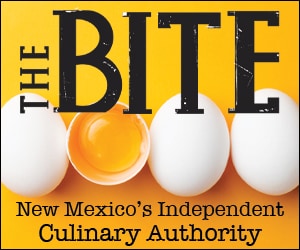Growing Local at Es Que Market
Words and Photos by Ungelbah Dávila-Shivers

Pantry essentials at Es Que Market.
If you are what you eat, imagine what you could become if your plate were always filled with meals sourced from the community you live in and the lands that surround you. Your veggies would always have tiny carbon footprints, your meats would come from livestock raised on ranches where they are loved and respected, and your atole and posole would come from grains that work with ecosystems rather than against them. You would become an extension of the land you live on. Where and how your foods are produced would matter to you, because they would no longer be “just food”—they would be direct rewards for investing in your neighbors’ livelihoods, in ancient cultures and traditional practices, in land stewardship and sustainability, and in your family’s long-term health and vitality. Best of all, food would no longer be something associated with fear, whether because of scarcity or because of hidden calories and chemicals. Good food would be valued, children would grow up with bellies full of essential vitamins and minerals fueling their imaginations, and dining tables would once again be the circles at the center of our communities.
Es Que Market, the headquarters for Swan Kitchen (SK), is one such table. Here, located in the heart of downtown Albuquerque, power couple Jessica and David Swan combine their lifelong involvement in regenerative agriculture, community advocacy, and the culinary world for an experience that goes well beyond breakfast burritos (although they do have those too).
“We have an understanding that food is medicine, and that we can take care of ourselves in the right ways if we’re eating right,” says Jessica, “so we offer a really great farm-to-table breakfast and lunch menu. We’ve been working with Agri-Cultura Network [ACN] since we started our school lunch program in 2014.”

Left: Marigolds drying. Right: Chef David Swan, co-owner of Es Que Market.
David and Jessica created Swan Kitchen in 2013, preparing food for a local delivery service. But when their oldest child started kindergarten in 2014, the Swans were horrified at the low-quality ingredients being used in school meals. A trained chef who has worked in restaurants since the age of thirteen, David decided to put his skills to work. Swan Kitchen got certified as a food vendor for the school systems, rented space at the South Valley Economic Development Center, and got busy preparing lunches for students using locally sourced food from farms within ACN.
“Why do New Mexicans, people who’ve been here for generations, get commodity food when we’ve been agricultural based for generations?” Jessica asks. “We know how to feed our gente, we just don’t have the resources [due to land loss]. Part of being a New Mexican is really understanding our history, and understanding that we’re all from farming families.”
In the fall of 2021, the three-thousand-square-foot building at the corner of Fifth and Lead became available, and since the Swans had needed to take a step away from the school lunch program during the pandemic, launching a breakfast and lunch spot with hours from 8 to 3, Tuesday through Friday, was a perfect fit for the busy parents. The building is owned by the Guadalupe Institute, a New Mexico nonprofit corporation that, among other initiatives, serves as a depository for La Virgen de Guadalupe memorabilia. The Swans designed the interior of Es Que—a play on SK that roughly translates to “it’s just that”—after the terracotta-orange and turquoise-blue tones of La Virgen’s image that appeared on Juan Diego’s tilma some 450 years ago. In one corner, an altar and collection of Guadalupe art and imagery make up a mini-museum installed by the Guadalupe Institute. Strands of marigolds, dried pomegranates, ristras of the Swans’ chile, and repurposed produce sacks create cozy moments throughout the market and dining area. Mason jars filled with blue cornmeal, posole, apple butter, honey, and other local pantry essentials are for sale alongside local art.

The Chicano, Chef Swan’s take on the cubano, with carnitas, serrano ham, red chile aioli, pickled green chile, and asadero and manchego.
The menu features all-day breakfast staples like burritos, atole (made from Tamaya blue cornmeal), and the Levanta, a sandwich with scrambled eggs, asadero, and serrano ham. Vegan options, such as La Huerta sandwich (seasonal veggies, pickled onions, and a spicy bean spread) and El Hongo (shredded barbecued mushrooms, vegan slaw), fill the lunch menu alongside meatier offerings like the hearty Chicano (pictured above). Over on the salad side, things stay creative with seasonal veggies and local greens. A blackboard lets customers know exactly where ingredients are coming from, listing producers like Big Bear Farm, Los Jardines Institute, St. Francis Ranch, ACN-allied farmers, Vibra Farms, and many more.
“As New Mexican small business owners, we need to stop exporting profits,” says David. “We are already one of the poorest states and we export 97 percent of what we grow. So we’re here to put our foot down and do the best we can not to let that happen in our community by showing, day by day, that keeping profit local can be done.”
On the second Saturday of each month, Es Que hosts Community Supported Dinners that give guests firsthand experience in how locally sourced, regenerative farming can be applied to fine dining. Here guests gather at a long family-style table and feast on seasonal dishes such as platters of roasted root vegetables and plates of juniper-roasted trout on blue corn grits, and sate their sweet tooth with a bit of toasted pistachio ice cream or chocolate lava cake.
“I’ve got twenty years of fine dining experience and so that has manifested into these Community Supported Dinners,” says David. “It’s kind of a play on community supported agriculture. And so we’re using local products to bring the community together.”
Meanwhile, the Swans are still involved with youth engagement and education. They sponsor cooking classes through ACN’s Cooking for Health program and do farm-to-table meals at the Gutiérrez Hubbell House, where they introduce families to some of their values and practices.
“The articles I’ve been reading say that when you buy from local farms you reduce your shrinkage [food waste] by at least 50 percent,” says Jessica. “We believe in being totally sustainable and regenerative farmers by using the ancestral agricultural knowledge that was passed down to us. Monsanto didn’t teach us. Our elders taught us how to farm, so it’s not, you know, greenwashing, it’s just traditional food the way it’s always been.”
319 Fifth Street SW, Albuquerque, 505-243-6563, es-que-market.square.site

Ungelbah Dávila
Ungelbah Dávila lives in Valencia County with her daughter, animals, and flowers. She is a writer, photographer, and digital Indigenous storyteller.
